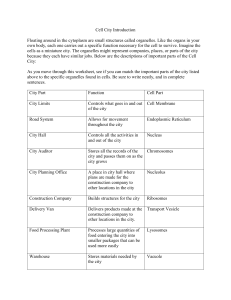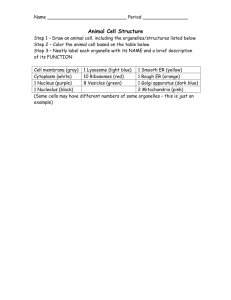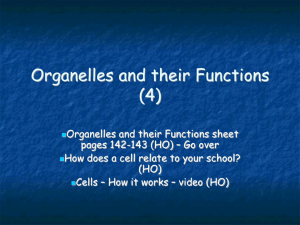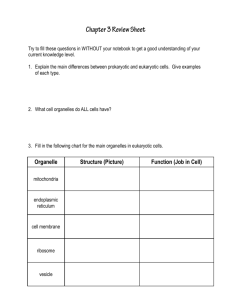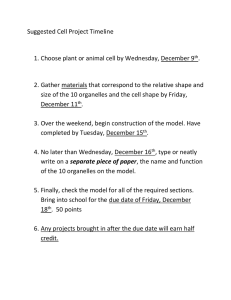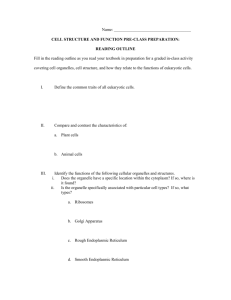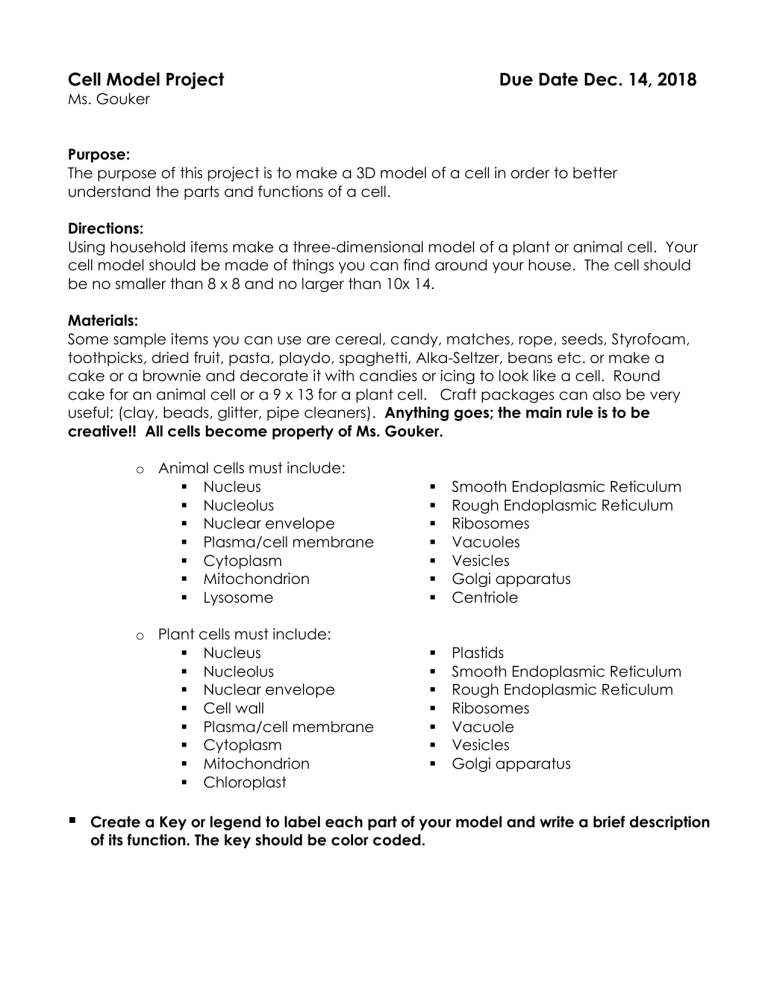
Cell Model Project Due Date Dec. 14, 2018 Ms. Gouker Purpose: The purpose of this project is to make a 3D model of a cell in order to better understand the parts and functions of a cell. Directions: Using household items make a three-dimensional model of a plant or animal cell. Your cell model should be made of things you can find around your house. The cell should be no smaller than 8 x 8 and no larger than 10x 14. Materials: Some sample items you can use are cereal, candy, matches, rope, seeds, Styrofoam, toothpicks, dried fruit, pasta, playdo, spaghetti, Alka-Seltzer, beans etc. or make a cake or a brownie and decorate it with candies or icing to look like a cell. Round cake for an animal cell or a 9 x 13 for a plant cell. Craft packages can also be very useful; (clay, beads, glitter, pipe cleaners). Anything goes; the main rule is to be creative!! All cells become property of Ms. Gouker. o Animal cells must include: Nucleus Nucleolus Nuclear envelope Plasma/cell membrane Cytoplasm Mitochondrion Lysosome o Plant cells must include: Nucleus Nucleolus Nuclear envelope Cell wall Plasma/cell membrane Cytoplasm Mitochondrion Chloroplast Smooth Endoplasmic Reticulum Rough Endoplasmic Reticulum Ribosomes Vacuoles Vesicles Golgi apparatus Centriole Plastids Smooth Endoplasmic Reticulum Rough Endoplasmic Reticulum Ribosomes Vacuole Vesicles Golgi apparatus Create a Key or legend to label each part of your model and write a brief description of its function. The key should be color coded. Cell Model Rubric Exceeds Standards (4) CATEGORY Quality of Model Appearance Creativity Organelles (on Project) Organelles (Key/Legend) Printed Rubric Meets Standards (3) Approachin g Standards (2) Below Standards (1) No Credit (0) Model is extremely well-build. Parts are securely attached to the model. Somewhat well-build. Some parts are slightly loose when the model is slightly shaken. Structure is well-built, but some parts have degraded (ex: cracked clay, faded paint). Bad construction. Extra care must be taken when moving/ handling the model. Extremely low quality. Many parts are loose, damaged, falling off, and/or missing. Model is the appropriate size. Key is typed/neatly written. It shows evidence of considerable effort. Appearance is neat, labels are t typed/neatly written. Project is organized and shows evidence of good effort. Good, creative use of materials. Some parts do not resemble the actual organelle. Labels are hard to read. Project is somewhat organized. Shows some effort was used. Labels are handwritten, illegibly done, and minimal effort was used. Project is too big or too small. Size is too big or too small. Appears hastily built and lack of effort is evident. Project shows some creativity. Most parts do not resemble actual organelles. Minimal creativity is used. Project is incomplete. Lacks creativity. Missing organelles. 11-12 organelles are correctly located and placed on the project. All parts are labeled. Key is neat, but not color coded, or typed/neatly written. Missing descriptions of 2-3 organelles. 1-2 spelling errors. 10 organelles are correctly located and placed on the project. Some parts are labeled. 8-9 organelles are correctly located and placed on the project. Missing most labels. 7 or less organelles are correctly located and placed on the project. No labels. Key is present, handwritten and messy; or too small. Descriptions of 4-5 organelles are missing. 3-4 spelling or grammar errors. Key is difficult to understand. Descriptions of more than 5 organelles are missing. More than 5 spelling or grammar errors. Key is not present. Cell model uses materials not often seen in most projects. Students used items that closely resemble the organelles. 13+ organelles are correctly located and placed on the project. All parts are labeled. Key is color coded typed/neatly written. Easy to follow. Each organelle has a description of its job. No spelling errors are present. Rubric was printed and brought in Grading Scale: 22-24 pts= A Total No Rubric 20-21pts= B 17-19 pts=C 15-16 pts=D 14-0=F
